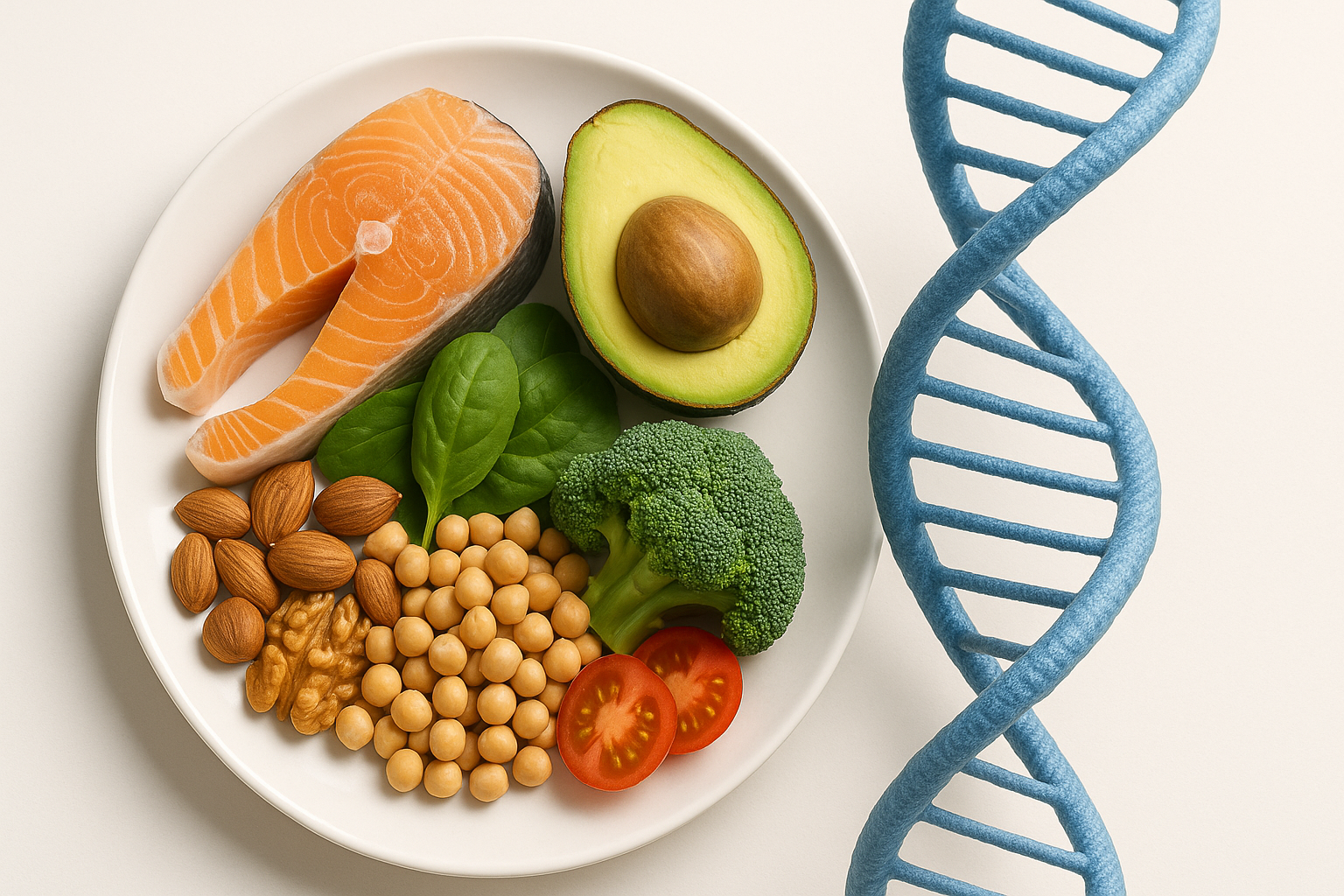
How Your Genes and Diet Interact: Insights from the Latest FTO Gene Study
There is increasing interest in personalized nutrition—an approach that takes into account an individual’s genetic background. Nutrigenetics, the science that studies the interaction between genes and nutrition, is opening new possibilities for improving health and preventing disease. In 2025, a significant study was published in the journal Clinical Nutrition ESPEN, examining how the FTO gene variant rs9939609 influences body composition (e.g., body fat and muscle mass) depending on a person’s dietary habits, especially protein and sugar intake.
The FTO Gene: What Is It and Why Does It Matter?
The FTO gene (fat mass and obesity-associated gene) is one of the most researched genes linked to overweight and obesity. The specific variant rs9939609 is associated with higher body mass index (BMI) and a greater proportion of body fat. This genetic variant is quite common. However, it’s important to note that carrying this variant does not automatically lead to obesity. Genetic effects often manifest in combination with environmental factors such as diet, physical activity, and lifestyle.
Study Design
The study was conducted in Argentina and involved adult volunteers. The researchers analyzed participants’:
- Genetic profile (using qPCR genotyping),
- Body composition (measured by bioelectrical impedance), and
- Dietary habits (assessed through a food frequency questionnaire).
The aim was to determine whether and how diet influences the effect of the FTO gene variant on body composition.
Key Findings
Participants who carried the A allele of the rs9939609 variant (considered the risk variant) showed the following differences compared to others:
- BMI was on average 1.4 kg/m² higher.
- Body fat percentage was 2.5% higher.
- Visceral fat (fat stored around internal organs) was 0.7 units higher.
- Skeletal muscle mass was 1.5% lower, potentially affecting metabolic rate and physical performance.
Interaction Between Diet and Genetics
The study highlighted several noteworthy interactions between diet and the FTO gene:
- Higher protein intake (e.g., from meat, fish, legumes) was associated with lower BMI and less visceral fat in individuals with the A allele. This suggests that a protein-rich diet may help offset the genetic predisposition to obesity.
- Higher sugar intake (especially from sugary drinks and processed foods) amplified the genetic risk—BMI, body fat, and visceral fat increased significantly in A allele carriers with high sugar consumption.
- Saturated fat intake affected skeletal muscle mass, particularly in A allele carriers, who experienced reduced muscle mass with higher intake. Limiting saturated fats may therefore help maintain muscle mass in these individuals.
- Certain food groups—such as dairy, eggs, and fruit—also showed differing effects depending on genotype.
Practical Implications
This study underscores that genes are not destiny—thoughtful dietary choices can significantly reduce genetic risks.
For example:
- If a person knows they carry the rs9939609 A allele, they may benefit from a high-protein, low-sugar diet.
- Reducing intake of refined sugars and sugary beverages can help prevent excessive fat accumulation.
- Regular monitoring of body composition (e.g., through bioimpedance analysis) provides better insights than simply tracking weight.
Conclusion
This 2025 study provides valuable scientific support for the development of nutrigenetics. It confirms that personalized nutrition—tailored to both genetic makeup and dietary habits—can help individuals make more effective choices for their health and fitness. Knowing your genetic predispositions allows you to balance them through smart dietary decisions.
Study Reference:
Olmedo, L., Luna, F. J., Dopazo, H., & Pellon-Maison, M. (2025). Protein and total sugars intake modulate the rs9939609 single nucleotide polymorphism effect at the fat mass and obesity-associated gene on body composition. Clinical Nutrition ESPEN, 68, 359–367. Advance online publication. https://doi.org/10.1016/j.clnesp.2025.05.032




